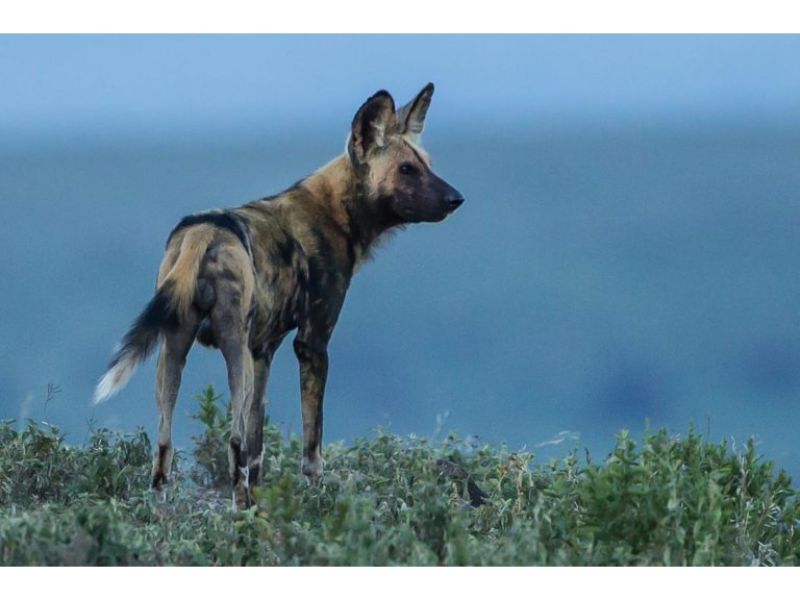The Serengeti region of Tanzania is home to a subspecies of the African wild dog known as the Serengeti wild dog. With only about 500 individuals still living in the wild, they are one of the most endangered animals on the planet. Though few in number, they are essential to the health of the Serengeti ecosystem and help keep predators like lions and hyenas in check.
The wild dogs of the Serengeti are extremely sociable and travel in packs of up to 40 individuals. All members of the pack work together to take care of the young and find food, under the leadership of an alpha male and female. Large game like antelope and zebra are no match for these canine hunters.
There are a few things you should know before adopting a Serengeti wild dog. First, they need a lot of room—at least an acre for each dog. Second, they are high-energy pets that require regular playtime in a secure, fenced-in area. Third, they aren’t usually friendly towards other pets or children, so they shouldn’t be adopted by families with young children or other pets. Last but not least, due to their endangered status, you’ll need to work closely with your vet to make sure your dog gets the special diet and medical attention it needs to stay healthy.
The Value of a Serengeti Wild Dog as a Pet
The Serengeti Wild Dog is a stunning and unique creature that can bring its owner a wealth of benefits. Even though they require a lot of work, they make wonderful pets.
- They’re incredibly devoted to their families and tend to develop close relationships with them.
- they can be trained to perform tasks or do tricks thanks to their high intelligence.
- They are great guard dogs and will keep your house safe from unwanted visitors.
- they don’t require as much care as canines or felines.
Advice on How to Take Care of a Serengeti Wild Dog
The Serengeti wild dog, the largest African canid, is a keystone species in the African ecosystem. How to take care of a wild dog in the Serengeti:
Offer a lot of room. A Serengeti wild dog requires a large fenced area for exercise and exploration.
Provide a wide selection of foods. Meat, bones, vegetables, and fruit are all good choices for a Serengeti wild dog’s diet.
Third, stay up-to-date on your shots. The Serengeti wild dog, like any other dog, should be vaccinated against canine diseases like rabies and distemper.
Educate your dog. Trained Serengeti wild dogs are easier to care for and less likely to wander off.
Feedback on the Serengeti Wild Dog from Real Users
If you’re thinking about getting a Serengeti Wild Dog as a pet, it’s a good idea to research customer feedback first. Some of the comments made by customers who have interacted with these creatures are as follows:
Users have reported that Serengeti Wild Dogs make wonderful companion animals. They form strong attachments to their owners and are known for their warmth and affection. They have a high IQ and can be taught to perform tricks and follow commands. They’re great companions if you have the time and energy to devote to them, but they need a lot of exercise and stimulation.
Similarly, Serengeti Wild Dogs require large areas in which to expend their boundless energy. You shouldn’t get one unless you have a big yard or easy access to a park or other open space where it can run around and play. In addition, they have a tendency to be loud, making them unsuitable for those who are confined to a small space, such as a flat.
If you have the time and energy to devote to their needs, Serengeti Wild Dogs make wonderful pets. You may find them to be devoted friends if you invest the time and effort into meeting their needs.
Serengeti wild dogs frequently suffer from these health problems.
The wild dogs of the Serengeti are a highly social species that travel and forage together in tightly knit packs. While generally healthy, there are a few conditions that seem to plague this breed more frequently than others. Some of the most common health issues in wild dogs of the Serengeti are as follows:
Canine parvovirus is a major threat to the health of Serengeti’s wild dogs (CPV). This virus spreads quickly and has the potential to be fatal, especially for younger puppies. If you live in an area where CPV is common, you should consider getting your dog vaccinated.
Canine distemper virus is another prevalent disease among Serengeti wild dogs (CDV). This virus is extremely dangerous because it attacks the respiratory, digestive, and nervous systems. Vaccinating puppies and young dogs against canine distemper virus is crucial.
Another condition that appears frequently in Serengeti wild dogs is hip dysplasia. The abnormal development of the hip joint is the result of this genetic disorder, which causes pain and lameness. Although dogs with hip dysplasia can have their condition treated surgically, it is best not to breed them.
Any dog is at risk for developing bloat, but deep-chested breeds like the Serengeti wild dog are particularly vulnerable. When the stomach becomes distended with gas and twists inward, a condition known as bloat occurs.
Advice on Education and Interaction
Early and consistent socialisation is one of the best things you can do for your Serengeti Wild Dog. Start off by walking your dog a few times around the block, and as they get older, increase the distance. So that they can adapt to any circumstance, it’s also important to expose them to many different types of people, environments, and activities.
Any dog, but especially a Serengeti Wild Dog, needs socialisation and training. Because of their high level of intelligence and eagerness to please, they are simple to train. Educate your dog on the fundamentals first, such as sit, stay, come, and down. You can move on to more complex tricks and obedience drills once your dog has mastered the basics.
Be patient and consistent with whichever method you choose for training or socialising. Invest some time and energy, and you’ll have a dog that’s well-rounded and prepared for anything!
Concluding Remarks and Analysis
As we wrap up this overview of Serengeti Wild Dogs, we’d like to share some closing thoughts and maintenance suggestions. The first thing you should know is that these amazing animals do best in large, open homes. They require less care than some other pets, but still need to be groomed occasionally. Finally, while they may not be the most cuddly animals, it is important to give them plenty of opportunities to interact with other dogs because they are very social creatures that thrive in groups.
We hope that after reading this, you will seriously consider adopting one of these incredible Serengeti Wild Dogs.

